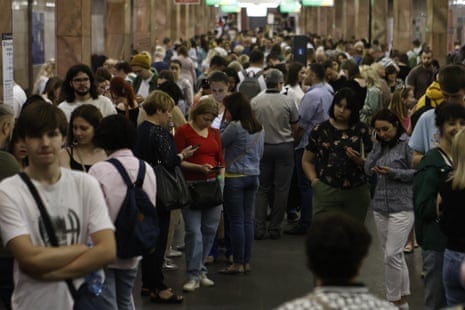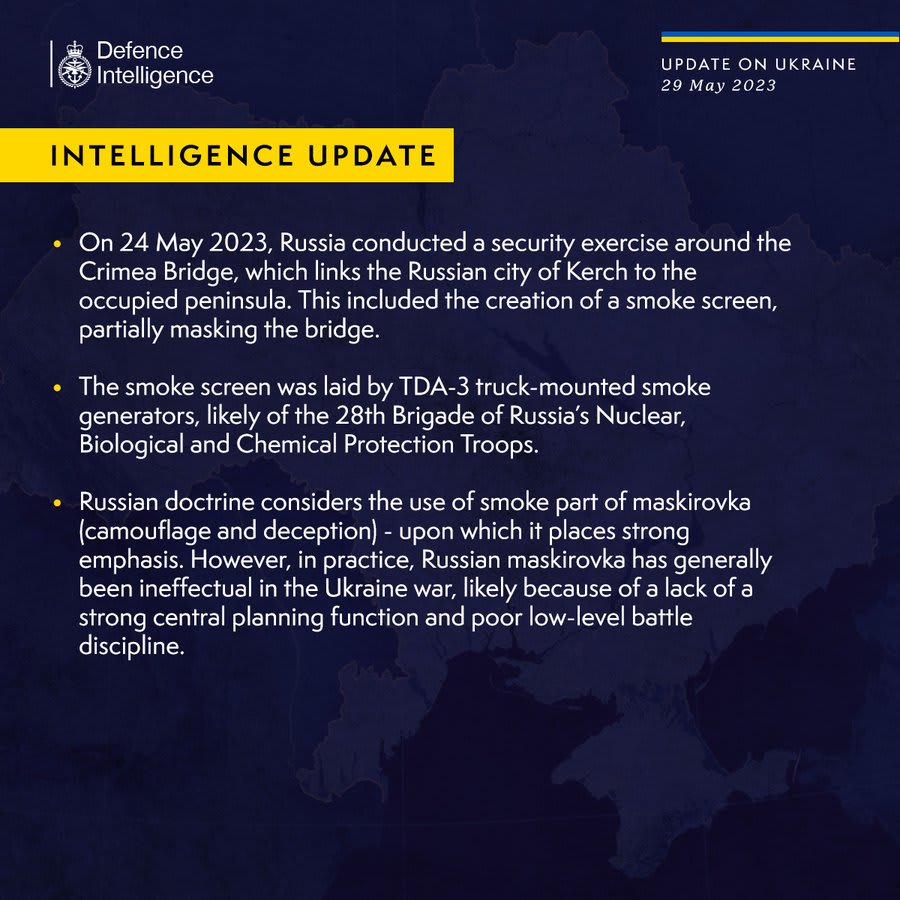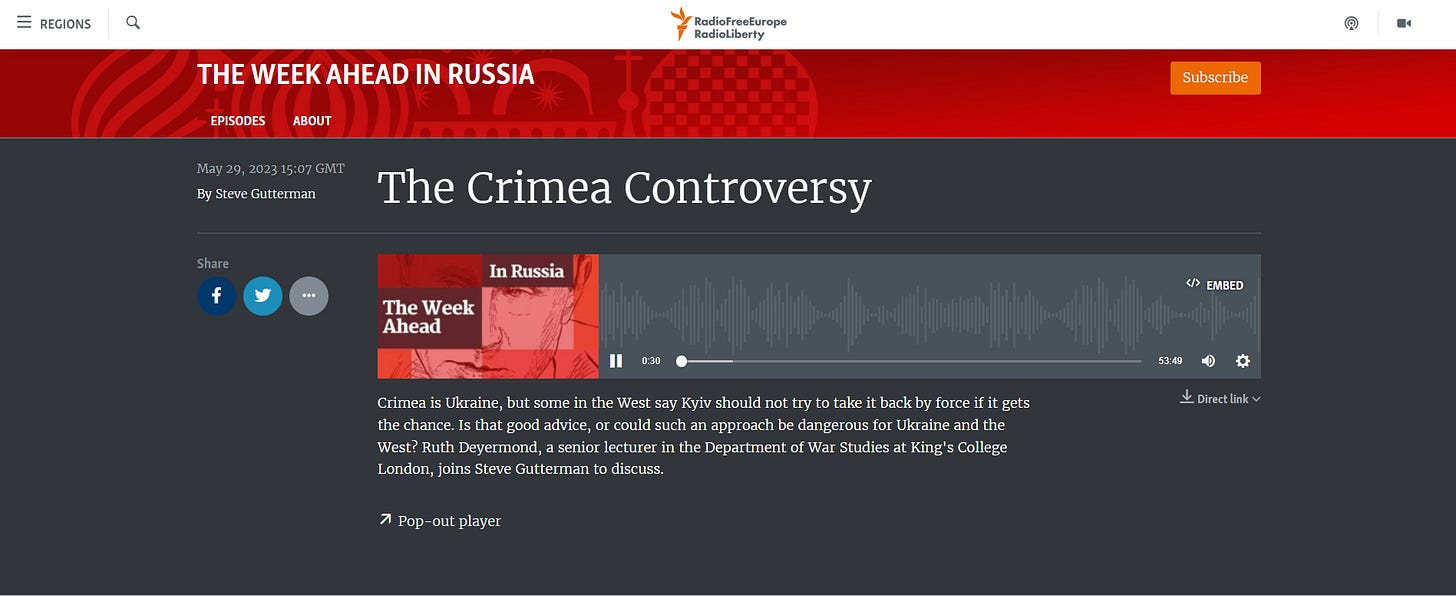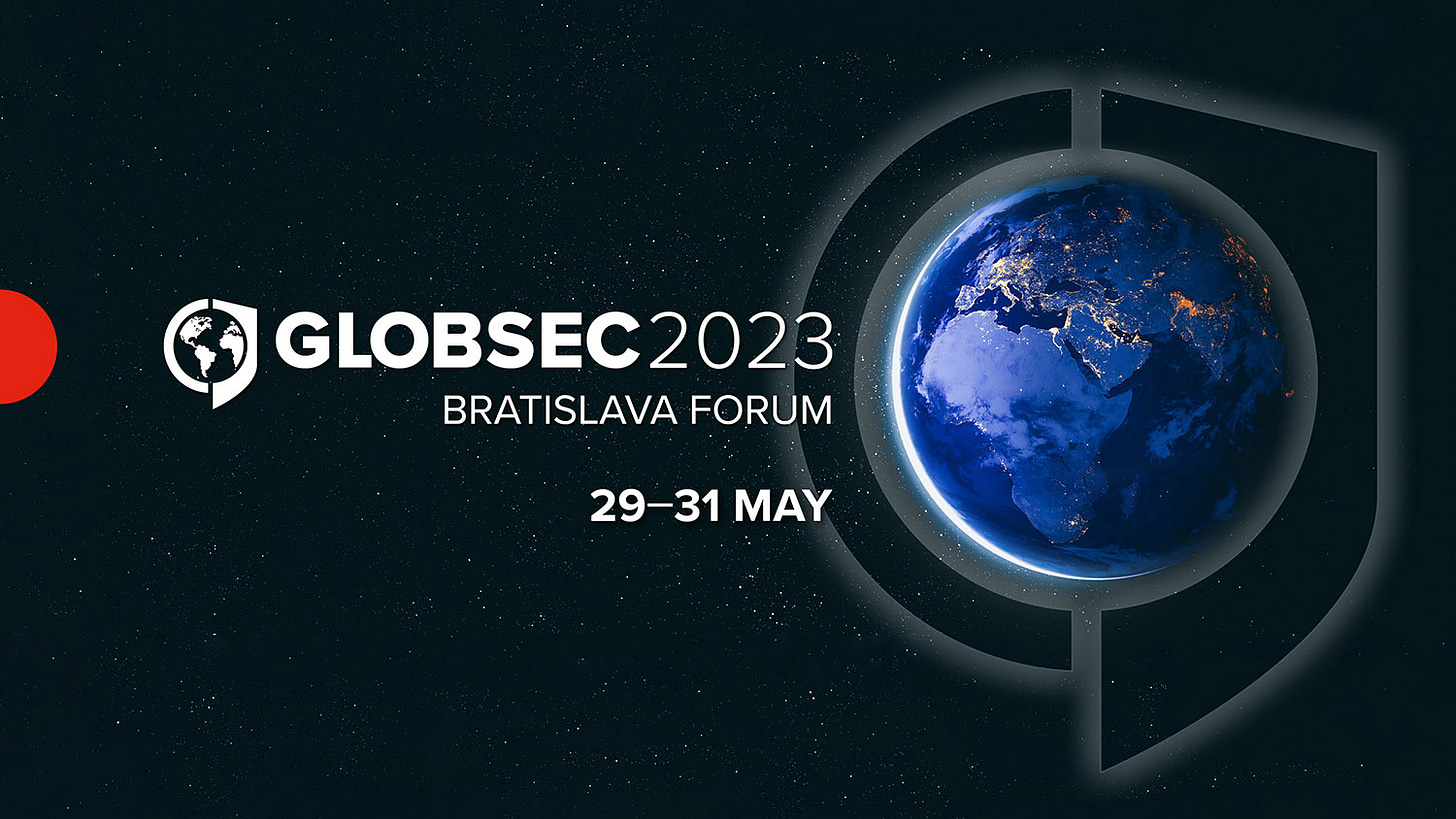May 30: E-Stories
Day 460: Kyiv RUairStrikes Dnipro Sevastopol Malyar Bakhmut Belgorod RUdomestic RUoil SaudiArabia Denmark Tokayev Georgia Moldova A&P Lucas UKDef MacKay jourovà Michta Hajdari Gutterman Kelin Globsec
Catching up…
EA Worldview’s Ukraine Up-date- hop over to Scott’s amazing hourly Ukraine up-date page. I’ll fill in with some bits and bobs.
Sign the petition here. I have.
Stories we’re following…
During the day, Russian troops launched two massive missile and air strikes on the territory of Ukraine. At night, the Armed Forces of Ukraine shot down 36 out of 40 Kh-101/Kh-555 cruise missiles and 30 out of 38 Shahed-136/131 drones. During the day, the Ukrainian military shot down all 11 Iskander missiles fired at Kyiv.
Residents ran to the city’s metro stations and other shelters after a succession of loud bangs as incoming missiles were intercepted and bursts of smoke from air defences dotted the sky.
Officials: Russian strikes injure 3, damage property in multiple oblasts over the past day. Russian forces launched massive strikes using artillery, drones, and aircraft on multiple oblasts over the past day, leaving three injured civilians and causing property damage, officials reported on May 29.
Russian forces attack Dnipropetrovsk Oblast, killing at least 1, injuring 9 others. Russian forces launched another attack against Dnipropetrovsk Oblast on May 29, killing at least 2 people and injuring nine others, Governor Serhii Lysak reported. Russia shelled two villages in the Kupiansk district of Kharkiv Oblast on May 29, injuring at least seven people.
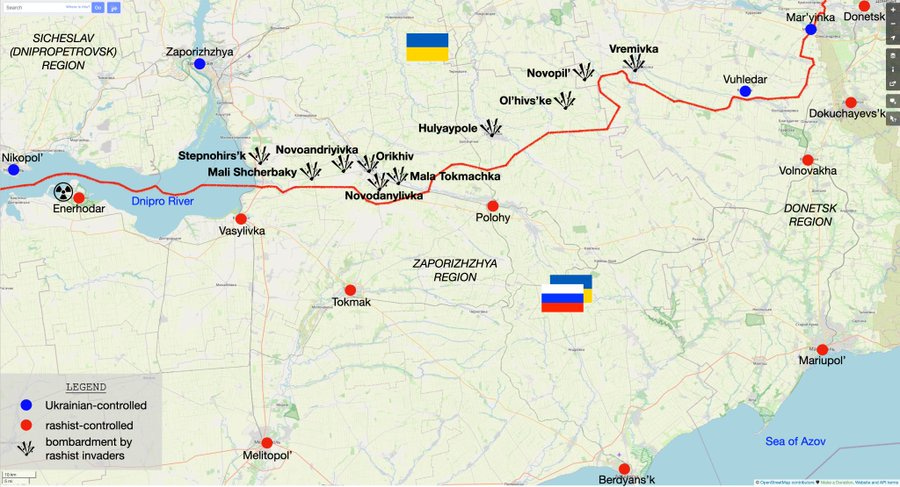
During the day, the Ukrainian military repelled 20 Russian attacks. In particular, the Russian troops advanced in the Kupyansk direction in the Masyutovka area and in the Maryinsky direction in the Maryinka area. In the Bakhmut direction, the Russian military did not advance during the day.
Ukrainian aviation inflicted 15 strikes on areas where Russian personnel and military equipment were concentrated, including Sevastopol. The rocket and artillery units of the Armed Forces of Ukraine hit three areas of concentration of weapons and military equipment, an ammunition depot, three air defense systems and three more important targets of the Russians.
Official: 100 soldiers killed in strike on temporary Russian base near Mariupol. About 100 Russian soldiers were killed, and over 400 were injured in a strike on a former healthcare facility in the village of Yurivka near Mariupol, exiled Advisor to the mayor of Mariupol Petro Andriushchenko reported on May 29.
Deputy Minister of Defense of Ukraine: the intensity of the Russian offensive in Bakhmut has decreased.
“The intensity of the offensive operations of the enemy has significantly decreased, as he replaces Wagner troops with regular units and tries to stabilize the defense in this direction. Our troops, by their actions, significantly complicate this process for the enemy. At the same time, the intensity of enemy artillery shelling has not decreased,” Deputy Defense Minister Anna Malyar wrote.
Governor reports Russia's Belgorod Oblast under fire. Ukrainian responded to Russian attacks by shelling Russia's Belgorod Oblast, according to the region’s Governor Vyacheslav Gladkov.
Putin signs ‘law’ allowing elections, forced deportations in Russia-occupied territories of Ukraine. Russian President Vladimir Putin signed a bill on May 29 allowing regional “elections” in occupied territories of Ukraine, which are planned for September this year, as well as forced deportations of the local population.
Russian state media: $36 billion lost from exiting foreign investors in past year, claims impact 'minimal' Foreign investors have withdrawn approximately $36 billion from the Russian market over the past year, Russian state-affiliated media RIA Novosti reported on May 29. (that’s not a lot.)
From June 1, Poland will close the border for trucks registered in Russia and Belarus. This, writes Interfax , is stated in the decision of the Polish Ministry of Internal Affairs. On May 29, Warsaw also imposed sanctions against 365 Belarusian individuals.
Opinion polls show that the majority of Russians allegedly support the war. Experts have noted many times that in the conditions of military censorship and real authoritarianism, these data cannot be trusted. Public support for the regime appears to remain broad.
Turkey has boosted purchases of Urals crude for May shipment to a seven-month high as Turkish refiners swell cheap Russian crude while other Mediterranean refiners suffer from a shortage of sour grades, data from Refinitiv Eikon shows. and reported by traders. Turkey remains the only major importer of marine shipments of Urals in the European region after the EU embargo, imposed on December 5 last year, as the country did not join the sanctions against Moscow. According to Refinitiv Eikon and Reuters calculations, about 230,000 barrels of Urals per day were shipped to Turkish ports in May, the highest since October 2022 and almost double April.
Saudi Arabia expressed dissatisfaction with Russia because of the volume of oil production. Riyadh officials believe that Moscow is not fully fulfilling its obligation to reduce it, writes The Wall Street Journal (WSJ). In April, both countries committed to cutting oil production by 500,000 barrels a day starting in May. However, Russian oil exports have been growing for several weeks in a row. As a result, the global glut increased, which led to a 10% decline in Brent prices. Saudi Arabia believes Russia is jeopardizing the kingdom's plan to raise energy prices.
Ukrainian parliament allows nationalizing banks owned by sanctioned figures. The draft law will enable the National Bank to nationalize Sense Bank (formerly Alfa-Bank), owned by Russian oligarch Mikhail Fridman, wrote Ukrainska Pravda news outlet. It is yet to be signed into law by the chairman of the Verkhovna Rada and President Volodymyr Zelensky.
Denmark plans to increase its spending on military aid to Ukraine by DKK 17.9 billion (US$2.6 billion) this year and in 2024, as reported by DR.dk citing Mette Frederiksen, Prime Minister of Denmark, on Monday.
"The war in Ukraine is now at a very critical moment, the situation on the battlefield is very serious, and therefore Ukraine needs all the support it can get," Mette Frederiksen believes.
Kassym-Jomart Tokayev, President of the Republic of Kazakhstan, has said that there is no need for his country to join the Union State of Russia and Belarus, and that it needs no nuclear weapons either, as reported by website of the President of Kazakhstan. Tokayev underscored that Kazakhstan remains committed to its obligations under these international treaties. He added that it is primarily economic cooperation that needs to be developed in the Eurasian region.
Una Hajdari: Today, for the first time since tensions erupted last year NATO peacekeepers intervened between Kosovo Serbs and Albanians. Thousands of Serbs gathered in north Kosovo towns to prevent Albanian majors from assuming office, forcing NATO to insert itself between the two sides.
Szabolcs Panyi: “I’m injured!” (“megsérültem!”), shouts a Hungarian @NATO_KFOR soldier on this video of Serbians violently attacking them. There are more than 20 Hungarian soldiers injured, 7 of them severely. (Meanwhile, Orbán’s government gives full political support to Serbia and Republika Srpska.)
[Marija Rustic: Dramatic footage from the streets of Zvecan by @evropaelire. Kosovo police confirms five people were arrested, while at least 41 @NATO_KFORsoldiers were injured, most of them Italian and Hungarian troops.]
Georgian parliament speaker says diplomatic relations with Russia 'strategic policy of patience.' Georgian Parliament Speaker Shalva Papuashvili said that the prospect of restoring diplomatic relations with Russia was not a "policy of concessions" but rather a "strategic policy of patience."
Moldova's president proposes new agency to tackle Russian disinformation, propaganda. Moldova’s President Maia Sandu warned against the dangers of Russian propaganda and disinformation in the country and proposed the creation of a new governmental body to counter this threat. The envisioned “Patriot Center” would coordinate and implement the state's strategy on combatting disinformation, Sandu said during a press conference on May 29.
Vera Jourovà: “Bye, bye birdie. Twitter has chosen a hard way to comply with our digital laws. Russia’s disinformation is dangerous and it is irresponsible to leave EU’s anti-disinformation Code. The Code remains strong, sets high standards and is at the heart of our efforts to address disinformation. In June I will meet signatories, so we can step up our actions, especially ahead of the elections.”
Turkish election fallout: The Turkish lira has hit a record low after the election win of the president, Recep Tayyip Erdoğan, in a renewed sign of the economic troubles his country is expected to face in the third decade of his rule. On Monday morning, the US investment bank Morgan Stanley predicted the Turkish currency would drop further this year, reaching 26 or even 28 to the dollar more quickly than previously anticipated.
The Russian ambassador to the UK, Andrei Kelin has told Laura Kuenssberg in a BBC interview that Russia has “enormous resources and we haven’t just started yet to act very seriously”. He repeated Russia’s line that that jailed Wall Street Journal reporter Evan Gershkovich is a “spy”. In response to a question by Vladimir Kara-Murza’s wife he said it was a decision of the “courts” rather than government-led oppression which led to his 25-year jail term.
Except for getting the Ambassador to admit to criminal activity, which could be used in a tribunal later on, I see no point in interviewing a Russian representative who will use the BBC’s international platform to further disseminate falsehoods and misinformation.
Andrew A. Michta on Defence24 Day in Poland
I’m in Warsaw for Defence24 Day [May 25]—an important platform for security and defense professionals, organized by Defence24 Poland. Each time I visit the Eastern flank (Finland, the Baltics, Poland, etc.) it’s clear that governments here recognize the urgency of the threat from Russia.
As I travel West, away from NATO’s frontier, security optics changes. In Berlin the conversation tends to refocus on economic & humanitarian questions, and defaults to the normative aspect of Russia’s invasion, i.e., violating the principle that borders can’t be changed by force.
In Paris geopolitics reasserts itself, but with a Southern azimuth, pointing to Med and Africa. As in Berlin, economic, humanitarian and normative issues provide the context for the conversation, with a clear undertone that we need to get to a negotiated solution in Ukraine.
I use these examples to suggest that while NATO is politically unified on Ukraine, there are different levels of appetite for risk-taking in Europe that correlate with geography and history. Countries along the frontier know this war is an existential question for them.
Nations live in neighborhoods, and security perceptions depend on who your neighbor happens to be. During the Cold War NATO allies shared similar threat perceptions because a war with the Warsaw Pact would have devastated us all, regardless of geography. The threat was clear.
Today’s Russia, bereft of its East European empire is seen outside the flank as a significantly smaller threat, and though its nuclear weapons are a constant concern (one that Putin has leveraged well), the threat is not felt with the same level of intensity across Europe.
Hence, the leaders in the US and Europe need to communicate to their publics the urgency of the threat Russia poses to our security, and that a Russian victory in Ukraine would undermine security worldwide. If we fail in Ukraine, we risk a wider war. And China is watching.
Listen to The Week Ahead Podcast with Steve Gutterman here.
Russian mercenaries behind slaughter of 500 in Mali village, UN report finds—The Guardian
First came a single helicopter, flying low over the marshes around the river outside the village, then the rattle of automatic fire scattered the crowds gathered for the weekly market.
Next came more helicopters, dropping troops off around the homes and cattle pens. The soldiers moved swiftly, ordering men into the centre of the village, gunning down those trying to escape. When some armed militants fired back, the shooting intensified. Soon at least 20 civilians and a dozen alleged members of an al-Qaida affiliated Islamist group, were dead.
Over the next five days, hundreds more would die in the village of Moura in the Mopti region of Mali at the hands of troops overseen by Russian mercenaries, according to a new United Nations report. All but a small fraction were unarmed civilians.
Published last week after an extensive human rights fact-finding mission conducted over several months by UN staff in Mali, the report gives an hour by hour account of events during a five-day military operation in Moura in March 2022, giving details of the worst single atrocity associated with the Kremlin-linked Wagner group outside Ukraine. [continue reading]
Programming note…
GLOBSEC’s 2023 Bratislava Forum is the preeminent international strategic conference on the frontlines of a newly divided world. The Forum has established itself as the most distinguished platform throughout the Central and Eastern European (CEE) region, and this 18th edition will remind the world that the CEE region has never been more crucial to ensuring global stability. In attendance over 1000 key stakeholders from over 65 countries.
Watch the Globsec 2023 Bratislava Forum here.





